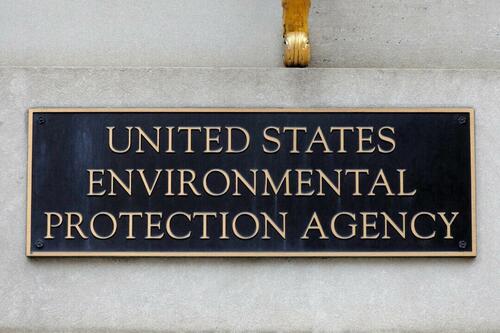
Appeals Court Allows EPA Clawback Of Climate Grant Funds: What To Know
Authored by Stacy Robinson via The Epoch Times (emphasis ours),
A federal appeals court has ruled that the Environmental Protection Agency (EPA) could legally rescind $16 billion in climate grants that had been awarded as part of the 2022 Inflation Reduction Act.
 Signage is seen at the headquarters of the United States Environmental Protection Agency in Washington, D.C., U.S., May 10, 2021. Andrew Kelly/File Photo/Reuters
Signage is seen at the headquarters of the United States Environmental Protection Agency in Washington, D.C., U.S., May 10, 2021. Andrew Kelly/File Photo/ReutersThat 2–1 ruling on Sept. 2 overturned a lower court order that blocked the administration from reclaiming the grant money and putting it to other use.
Where Did the Money Come From and Where Did it Go?
As part of the 2022 Inflation Reduction Act, Congress allocated $27 billion for the Greenhouse Gas Reduction Fund, which was designed to power alternative energy initiatives.
Nonprofit groups competed for the cash, winners were picked, and the full $27 billion was allocated by mid-August 2024, in the form of subgrants given out by three umbrella agencies.
Court documents later noted that the grant structure for this massive project was unique: Normally, the funds are held by the Treasury Department and disbursed as needed. For the first time, the EPA placed the funds with Citibank, which acted as a “financial agent” for the United States.
Trump Elected, Red Flags Raised
On Dec. 3, independent journalism outfit Project Veritas released a video showing an EPA employee explaining that the agency was distributing money for climate programs at an accelerated speed, as an “insurance policy” in case Trump decided to end those programs.
“It truly feels like we’re on the Titanic and we’re throwing like gold bars off the edge,” the employee said.
Such projects came under scrutiny after Trump took office. The FBI asked Citibank to freeze Greenhouse Gas Reduction Fund payments in February.
On March 3, the EPA said it was referring the Greenhouse Gas Reduction Fund to its inspector general for investigation of alleged “financial mismanagement, conflicts of interest,” and possible fraud.
The announcement noted that one recipient organization had reported $100 in revenue for 2023, but was awarded $2 billion in 2024.
EPA head Lee Zeldin released a statement on March 11 announcing he had terminated the grants, citing concerns over “program integrity, the award process, programmatic fraud, waste, and abuse, and misalignment with agency’s priorities.”
“The days of ‘throwing gold bars off the Titanic’ are over,” Zeldin said.
The Green Bank Legal Battle
The Climate United Fund brought a suit in March on behalf of itself and four other organizations. All the plaintiffs were “green banks,” organizations that worked to provide financing for alternative energy projects.
The plaintiffs argued that withholding the funds was “illegal, and the grants had been terminated with no notice or explanation, and without presenting evidence that the organizations were guilty of ”waste, fraud, and abuse.”
They also said the EPA—part of the executive branch—was violating the separation of powers because it was not enforcing the Inflation Reduction Act, which had been passed by Congress.
The government countered that changes in the grantees’ contracts—made after Trump was elected—gave the EPA little “oversight and transparency” on how the money was spent.
Most importantly, the government said the matter was a contract dispute and should be heard in the Court of Federal Claims, not a district court.
Court Decisions
U.S. District Judge Tanya Chutkan temporarily blocked the EPA and Citibank from withholding the grant money in March, and extended that block on April 16.
Chutkan said “the record does indicate that EPA seeks to dismantle these grant programs in their entirety as a policy matter,” but that power belongs to Congress.
“Obviously, when an organization is created to fulfill the objectives of a grant and its existence relies on grant money, harm is certain once the grant funds are withdrawn,” she wrote in her opinion.
The U.S. Court of Appeals for the District of Columbia Circuit halted Chutkan’s order to give the government time to appeal.
While the case was playing out, Congress enacted recissions that eliminated the Greenhouse Gas Reduction Fund—but this only reclaimed $19 million because the rest was still being held by Citibank.
Eventually the Appeals Court overturned Chutkan’s ruling.
The 2–1 majority ruled that the case belonged in the Court of Federal Claims, since the “challenge to the grant terminations is a disguised contract claim that cannot be heard in district court.”
Climate United Fund CEO Beth Bafford issued a statement saying the ruling was disappointing, but the organization’s work will continue.
“This is not the end of our road,” she said.
The EPA celebrated the ruling in a statement, saying “It’s fantastic to see reason prevail in the court system.”
The Implications?
Legal scholar and commentator John Shu told The Epoch Times that “the plaintiffs are in a tough position of their own making.”
Because of the unique structure of the grants, Shu said he didn’t think the case would have far-reaching implications.
The climate groups may appeal to the Federal Court of Claims, or they may ask the appeals court for an “en banc” hearing before a panel of all its judges, instead of just three.
“I don’t think that’s going to happen because that would further delay getting their money, if they get it at all,” Shu said.
The same goes for a possible hearing by the Supreme Court, he said. A decision could take years, and the plaintiffs’ suit stated that the climate groups were already short on cash to pay employees.
Tyler Durden
Thu, 09/11/2025 – 11:45
